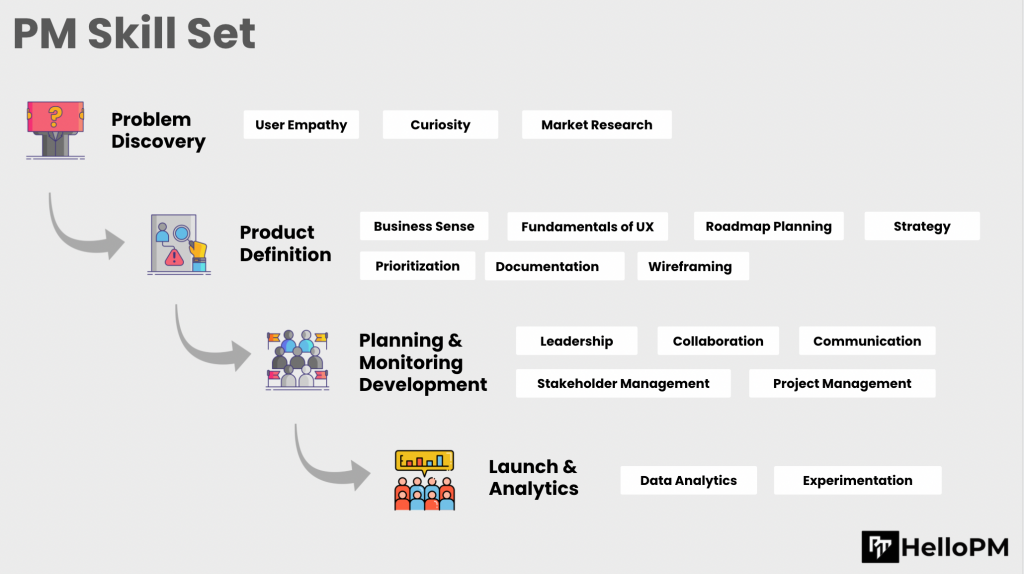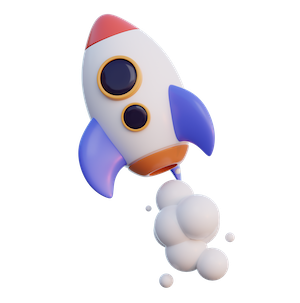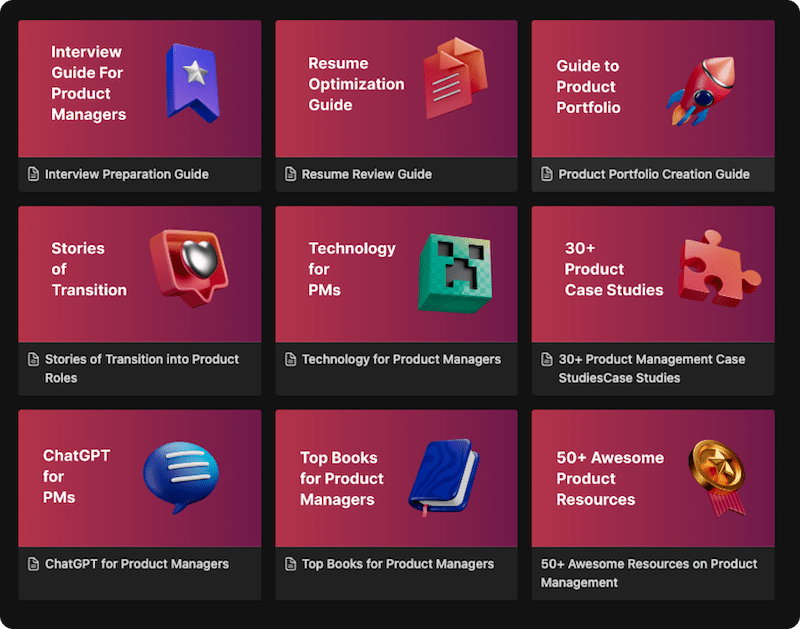Congratulations on getting your resume shortlisted!
The next step is to understand the various questions asked in product management interviews and how to approach them.
This guide is an attempt to collect the best resources available to help you crack your next product management interview.
If you are more of a video person, do check this video and following playlist for preparing for your next product interview.
What skills are companies looking for in product managers?
Before we understand the questions asked in product management interviews, we should first understand why these questions are asked at all?
As you would know, the job responsibilities of product managers (no matter the seniority) are very diverse and ever-evolving.
The organizations want to make sure that you are someone who has all the skills required for getting the job done really well. Generally, the 8 important skills most organizations look for from an incoming product manager are:
- Ability and willingness to think from user’s perspective
- Business sense (how will this make money? increase our market share?)
- Communication skills (stakeholder management, documentation, interviews)
- Leadership traits (ownership, leading without authority)
- Problem solving skills (UX, First principles, Structured thinking)
- Planning and Strategy (product roadmap, competitive analysis)
- Analytical thinking (metrics and experimentation)
- Ability to execute (stakeholder management, project management)
8 sounds a lot, right? But to be successful in an impactful role like product manager one needs to excel at all or the majority of these skills.
In order to assess a candidate, the organization has made a few categories of questions that help them (to a certain extent) understand how good they are at these 8 or more skills.

Various types of questions asked in product management interviews are:
- Product design questions
- Strategy questions
- Guesstimation questions
- Behavioral questions
- Technical questions
- Analytical questions
We’ll now look at them briefly and share helpful resources for each of them.
Also, keep in mind that it’s not necessary that all of these would be always asked as separate questions. It’s common to see interviewers combine multiple of these into one problem statement.
At the bottom, we’ve also attached a link to an exhaustive set of product management interview questions.
Product Design Questions
These are by far the most popular kind of assessments (also known as product sense questions) and could be seen at almost every product interview. Sometimes (mostly for beginner roles) these are also given as take-home assignments.
Typical examples of product design questions are:
- How would you improve X product?
- Whats your favorite product and how would you improve it?
- How would you design a refrigerator for blind people?
- Facebook wants to enter travel domain, what would their product look like?
- Design a product that helps people become healtheir.
(an exhaustive list is attached at the end of this post)
With these kinds of interview questions the recruiters are generally looking to gauze for the following traits from the candidates:
- Ability to understand users and their needs.
- Prioritization skills
- Result orientation
- Structured thinking
- Creativity
One of the popular structures that is followed while answering these questions is:
Step 1: Clarify your understanding of goals and define scope.
Step 2: Articulate possible user personas (types of users and their traits).
Step 3: Articulate the needs of these users.
Step 4: Prioritize the most important problems (how critical is the problem and how are they solving it right now?).
Step 5: Brainstorm multiple solutions for the prioritized problems.
Step 6: Prioritize these solutions (You can use MOSCOW, KANO or RICE frameworks here)
Step 7: Define success metrics for the proposed solution.
Step 8: Summarize
Important resources to help you crack product design questions:
– Circles Framework
– Solve product case study in 4 simple steps
– Product case studies inspiration
– Improve instagram
– Solving product design questions
– Product design mock interview by Sugat
– How to approach product design questions
🌟 Sugat is an instructor at HelloPM and leads the interview preparation module. He has interviewed and gathered experiences from candidates from companies like Google, Meta, Microsoft, Expedia, Flipkart, Upgrad, MakeMyTrip, etc.
Strategy Questions
Strategy questions are mostly asked in senior roles. However, having a good understanding on this front can get you brownie points as a beginner candidate as well.
A few examples of strategy-related questions in product management interviews could be:
- Evaluate competitor landscape for AirBnb.
- Should google get into ride sharing business?
- What should be the next product from Razorpay?
- How would you create the product roadmap for Tesla?
- How should Unacademy go international?
These questions help interviewers understand a candidate’s problem-solving abilities, communication skills, structured thinking, and market understanding.
Candidates can also showcase their ability to transform a vague problem statement into a well-defined roadmap.
Important resources to help you answer product strategy questions:
– A guide to solving product strategy questions
– Solving Google’s product strategy questions
– Learn about product strategy stack
– Thinking from first principles
– Video: How to answer product strategy questions
Guesstimates
Guesstimates are very common in both product and consultancy interviews. As a product manager many times you will find yourself doing a lot of back of envelope calculations, whether it is for determining the next best market to launch your product in, or in calculating the reach of your feature to take a better prioritization decision.
A few popular examples of guesstimates in product management interviews are:
- How many dentists are there in Mumbai?
- How many flights take off from New Delhi every hour?
- How many photos are uploaded on instagram every day?
- What is the total number of people online in India right now?
- Estimate the market size for online groceries companies in India?
The unique thing about guesstimates is that for people who know how to answer them they appear like the easiest ones, while for people who do not how to approach them, these might look absolutely vague and nightmarish.
Here are a few tips that can help you solve such questions:
- Ask clarification questions and clear out the scope: Its possible that your understanding and interviewers understanding of the problem statement might be different. Take time and ask clarification questions to make sure both are on the same page.
- Brainstorm loudly: Do not make a mistake of doing all the calculations and making assumptions yourself. Think out loud so that you are assured that you are in the right direction and change course quickly if needed.
- Answer almost never matters: Interviewers aren’t looking to exact answers around these vague questions, they are looking to understand your thought process. The process you follow to find the answer is more important than the answer.
- Create an equation: Break down your whole calculation into a equation with known and unknowns. This helps you to come back later and modify these variables.
- Keep you numbers easy: Move away from decimals and difficult numbers. This will help you do quick calculations laters.
- Do a summary and sanity check in the end: After arriving at the answer, summarize the whole process, assumptions and logic. Also do a sanity check with numbers, so that your answer is not way-off. Example: If your calculations show total number of people online in India are 900 mn, then you need to recheck your calculations because internet penetration in India it itself limited to 41%.
Here is a cheat-sheet that can come in handy for your guestimates.

(Source: 180 degrees consulting)
Here are some resources to help you prepare for guesstimate rounds:
– The definitive guide to market sizing questions
– Examples of market sizing
– Answering Estimation questions in PM interviews
Behavioral Questions
Product management is a leadership role, you have to lead your teams to success without having direct authority over them. For such a role behavioral questions are the go-to tools for interviewers to assess any candidate’s leadership qualities.
Some popular behavioral questions asked in product management interviews are:
- Tell me about the challenge you had with your co-worker and how you handled it?
- What was your proudest moment as a product manager?
- How did you resolve conflict amoung different groups?
- Why do you want to join this company?
- How do you communicate with engineers?
You can use the popular STAR framework to articulate structured answers here.
The best resource for the behavioral round is “Amazon’s behavioral principles”. No matter what company you are applying for if you can read and understand these principles well, and find an instance in your career where you might have used them, your behavioral interview will be better than most of the candidates.
Here are a few resources to help you prepare for this round:
– STAR Interview Method
– Amazon Leadership Principles
– Explaining Amazon’s Leadership Principle (My friends Amit & Kumar Vimal had a jam)
Technical Questions
While you are not expected to do have hands-on knowledge of coding and maintaining complex technical systems as a product manager, you should have a good idea of how technology works.
You need to be good at empathizing with engineers, helping them with trade-offs, and enabling them to operate efficiently.
Interviewers primarily ask technical questions to test your ability to work with engineers, your understanding of common technical terms, and your problem-solving mindset.
Please keep in mind that having a technical background or a formal degree in technology is not at all a requirement for many of the product management roles out there. You just need to be curious and have the willingness to learn.
Here are a few examples of questions that might be asked in technical rounds:
- How would your explain cryptocurrency to a 5 year old?
- Walk me though the technical details of the product your past company has created?
- How does QR code works?
- Why do we need APIs?
- How can you increase the speed of a website?
The technical interview questions could also be classified into five broad categories:
- General technical literacy: How computer, internet and common systems work.
- Programming: These are mostly asked for technical product manager roles and include discussions around data structures, and algorithms.
- Systems design: How would you create high level architecture of a product or a feature.
- Your past experience: The technical know how of products you have worked with in the past. Make sure you talk to your developer mates to understand how your current systems work!
- Prioritization: How would you estimate tech efforts and prioritize using impact v/s efforts?
Here are resources that could help you develop tech understanding for your product interview:
– Recordings of Tech 101 for product managers – Jan 22 cohort.
– Recordings of Tech 101 for product managers – Nov 21 cohort.
– SQL for product managers
– RICE for Prioritization
– Explain Like I am five – tech terms
– Designing Netflix
– System Design Dropbox
– Getting to Technical Enough as a Product Manager
– PM Tech Lessons
– CS50 – if you are real serious about learning technology
Analytical Questions
As a Product Manager, you need to be analytical. Every initiative you take, every improvement you suggest, every feature request you make: has to be backed by strong customer insights and data.
Root cause analysis questions also are categorized in analytical questions.
You need to have a strong command of how to interpret customer behavior and convert vast amounts of data into insights.
While there are frameworks such as AARRR, HEART, North Star Metric, and methodologies like cohort analysis, funnel analysis, segmentation, etc. to help you out, your real friend in these interviews are your critical thinking skills. Can you convert customer behavior into something measurable and associate it with business goals?
Some common examples of analytical questions and RCA are:
- Comments on instagram have gone down by 40% in last one month? How would you find the root-cause?
- How would you define success metrics for Linkedin’s skills endorsement feature?
- What could be the north star metric for a school attendance system?
- You are the PM for Google Cloud Storage – How would you measure success?
- Why do we need A/B testing when we can test features one after the other?
Here are a few resources which can help you excel in these rounds:
– AARRR Framework
– Choosing your north star metric
– How to measure product success
– Defining Success Metrics
– Product Analytics
At HelloPM we have a strong focus on developing analytical capabilities in our participants, we have a dedicated module that covers all aspects of product analytics in detail through live-session led by experts.
Additional Resources:
Lewis Lin’s List of PM interview questions
Book Recommendations: Cracking the PM interview, & Decode and Conquer.
This is a live resource and we will keep on updating it from time to time, if you have feedback or any resources you want to add here, please reach out to us by writing to info@hellopm.co
 WATCH HELLOPM COHORT IN ACTION
WATCH HELLOPM COHORT IN ACTION



0 thoughts on “The ultimate list of resources for your next Product Management Interview”
Comments are closed.